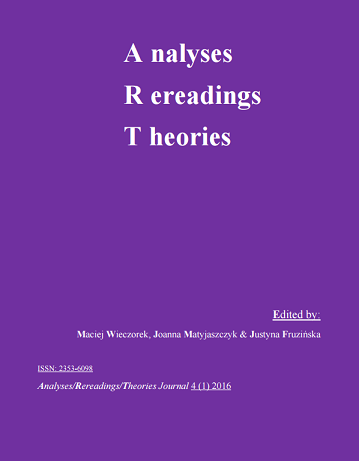“Reread me backwards”: Deciphering the Past in Elizabeth Bowen’s The Heat of the Day
DOI:
https://doi.org/10.18778/2353-6098.4.04Keywords:
Bowen, spy novel, reading, BlitzAbstract
Set during the midst of the London Blitz, Elizabeth Bowen’s The Heat of the Day revolves around a narrative of espionage, but unlike many novels from the spy genre, it refuses to disclose all of its secrets. Instead, the novel’s dense and complex language, which so effectively expresses the dislocating effects of a city under attack, resists an easy or uncomplicated reading. This article examines the motif of reading within the novel, which manifests when its protagonist, Stella Rodney, learns her lover Robert is a Nazi spy. In her efforts to locate proof of his defection, Stella becomes caught in a recurrent but indeterminable task of rereading past events, a movement which attempts to remember the past but also foregrounds a fundamental inability to ever wholly resolve its enigmas. When Stella fails to read her past for lost clues, she is prevented from viewing the events of her life as a coherent and meaningful narrative. The novel’s difficult language reflects this lack of resolution, refusing to assimilate the events it depicts into a straightforward account. With its wartime setting as a disorienting backdrop, The Heat of the Day undermines the purpose of reading as the discovery of sense and meaning, producing instead only more questions and mysteries.
References
Bennett, Andrew, and Nicholas Royle. Elizabeth Bowen and the Dissolution of the Novel. London: Macmillan Press Ltd., 1995. Print.
Google Scholar
DOI: https://doi.org/10.1057/9780230374355
Bowen, Elizabeth. The Heat of the Day. New York: Knopf, 1949. Print.
Google Scholar
Freud, Sigmund. “Mourning and Melancholia.” The Standard Edition of the Complete Psychological Works of Sigmund Freud. Ed. and Trans. James Strachey. Vol. XIV. London: The Hogarth Press, 1994. 243-58.
Google Scholar
Gildersleeve, Jessica. Elizabeth Bowen and the Writing of Trauma: The Ethics of Survival. Amsterdam: Rodopi, 2014. Print.
Google Scholar
DOI: https://doi.org/10.1163/9789401210478
Glendinning, Victoria. Elizabeth Bowen: A Biography. New York: Random House, 2006. Print.
Google Scholar
Hepburn, Alan. Intrigue: Espionage and Culture. New Haven: Yale UP, 2005. Print.
Google Scholar
DOI: https://doi.org/10.12987/yale/9780300104981.001.0001
Howard, Michael S. Jonathan Cape, Publisher. London: Jonathan Cape, 1971. Print.
Google Scholar
Lassner, Phyllis. Elizabeth Bowen. London: Macmillan Education Ltd, 1990. Print.
Google Scholar
DOI: https://doi.org/10.1007/978-1-349-20529-5
Lee, Hermione. Elizabeth Bowen: An Estimation. London: Vision Limited Press, 1981. Print.
Google Scholar
Moretti, Franco. Signs Taken for Wonders: Essays in the Sociology of Literary Forms. Trans. Susan Fischer, David Forgacs, and David Miller. London: Verso, 2005. Print.
Google Scholar
Seed, David. “Spy Fiction.” The Cambridge Companion to Crime Fiction. Ed. Martin Priestman. Cambridge: Cambridge UP, 2003. 115-34. Print.
Google Scholar
DOI: https://doi.org/10.1017/CCOL0521803993.008
Teekell, Anna. “Elizabeth Bowen and Language at War.” New Hibernia Review 15.3 (2011): 61- 79. Project MUSE. Web. 24 August 2015.
Google Scholar
DOI: https://doi.org/10.1353/nhr.2011.0031
Winter, Jay. Sites of Memory, Sites of Mourning: The Great War in European Cultural History. Cambridge: Cambridge UP, 1995. Print.
Google Scholar
Ellmann, Maud. Elizabeth Bowen: The Shadow Across the Page. Edinburgh: Edinburgh UP, 2003. Print.
Google Scholar
DOI: https://doi.org/10.1515/9781474497114
Downloads
Published
How to Cite
Issue
Section
License

This work is licensed under a Creative Commons Attribution-NonCommercial-NoDerivatives 3.0 Unported License.









